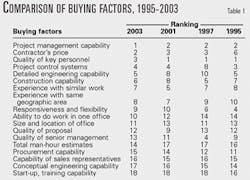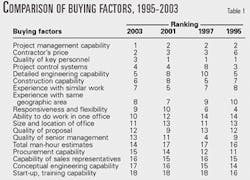Study: Project management capability key to selecting engineering contractors
Owners of downstream petroleum and chemical companies rank project management capability as the main consideration in choosing engineering contractors, says a recent industry study. The owners also have concerns about the viability of contracting companies and the supply of reliable engineering resources.
These are some of the conclusions of a biennial survey of the global downstream engineering, procurement, and construction (EPC) industry by Transmar Consult Inc., Houston.
The study designated seven engineering contractors as leading firms: Bechtel Corp., Fluor Corp., Jacobs Engineering Group Inc., JGC Corp., KBR, Snamprogetti SPA, and Technip-Coflexip.
Between October 2002 and February 2003, Transmar conducted 102 interviews in North America, Europe, and Asia.
The interviewees' areas of responsibility included:
- Engineering, 22%.
- Construction, 18%.
- Project management, 28%.
- Planning, 7%.
- Procurement, 7%.
- Senior management, 18%.
- Capital investment
Petroleum refiners and petrochemical companies are all suffering financially, according to the study. Low profit margins and considerably higher debt levels over the past 2 years have forced some companies to place some plants on the selling block and close others. The study identified 14 refineries for sale in Western Europe and North America.
The Transmar study identified three areas of capital investment: Russia and Eastern Europe, Asia, and the Middle East.
Russian national oil companies have large cash reserves and are buying up chemical plants and refineries in Eastern and Central Europe. These companies have surplus production and need facilities to process the excess hydrocarbons. In addition, their existing assets are antiquated and will require extensive revamping.
"Yukos recently bought up the Mazheikiu Nafta refinery and its pipelines in Lituania," said a strategic planning executive from a major oil company quoted in the study. "Yukos is also moving into the Gdansk refinery in Poland and in Slovakia. Lukoil is very actively looking to buy up refinery assets in Greece, Bulgaria, and Romania."
Markets in Asia, especially China, are growing rapidly and will need significant capital investment in refining and bulk chemical plants.
"Asia is the key economic region for the next 50 years," according to a senior project executive at a major chemical company. "The populations there are growing fast and getting richer. Europe as a region on the other hand will have a severe decline in population."
The Middle East is a growth market for petrochemicals due to large amounts of cheap raw feedstocks.
"The possibilities for investment in refining and petrochemicals are so much better in Asia or the Middle East," said an interviewee from a US independent refiner. "In these regions you have the chance to make a buck."
Owner perceptions
The study identified some major themes during the interview process.
Owners perceive the global engineering contractor industry as increasingly fragile. There are fewer contractors and their financial health is declining. Owners perceive the quality of contractor services as deteriorating.
"We have increasingly placed more of the liabilities for our projects on the shoulders of the engineering and construction firms. In general, we are more demanding of all our equipment and service suppliers," said one senior planning executive. "It seems to us that the engineering industry is financially fragile and that the quality of the resources available is steadily declining."
Korean engineering contractors and constructors provide owners useful pricing leverage compared to US, European, and Japanese contractors. They are placing downward pressure on prices and are more accepting of risk and liabilities.
Owners prefer competitive bidding to the establishment of strategic alliances. European owners in particular dislike owner-contractor alliances.
The long-term future for building new refineries and bulk chemical plants in Europe and the US is dismal due to the rapidly aging populations of these regions. The large population and growing income of a region like China make it a target for petroleum and petrochemical investment.
The study said that many owners believe that pure chemical companies will continue to abandon the petrochemical business for more lucrative specialty and fine chemical markets. Many owners believe that the integrated majors have an inherent advantage in petrochemicals.
EPC contractor selection
Owners rank project management capability as the number one consideration for choosing among EPC contractors for a project. The next assessment factors, respectively, were contractor's price and quality of key personnel.
Table 1 lists the assessment factors in order of importance to owners. Compared to responses in 2001, owners are placing more importance on cost and project performance than scheduling considerations.
Owners gave higher average ratings on 14 of the 18 buying factors compared to the last study. In 2001, the average buying factor score for all 18 factors was 6.43. In the most recent survey, the score increased to 6.83.
According to the study, while project performance factors are becoming increasingly more important, the number of viable and financially stable engineering contractors with technical depth is shrinking.
Soft factors such as responsiveness, flexibility, and quality of senior management declined in relative importance.
The shift in bias towards pricing considerations and capabilities is due to more owners building refineries and heavy chemical plants in the Middle East and Asia. These regions require owners to partner with companies with a strong preference for lump-sum contracting. And many owners believe that US engineering contractors are at a strategic advantage regarding international work due to an inability to adapt to lump-sum contracting.
The study indicated that knowledge of local geography and its regulations is growing in importance. In the 1997 study, this factor had a 7.09 rating score, which increased to 7.39 in the 2003 study.
Procurement capability is losing relative importance because, according to the study, procurement is increasingly viewed as a commodity produced through sophisticated information technology systems. The score dropped to 5.07 in 2003 from 6.55 in 1997.
Quality of senior management is also declining in importance. The score factor fell to 6.88 in 2003 from 7.52 in 1997.
Strategic issues
The study identified major long-term evolving strategic issues, many of which started in the 1980s:
- Industry consolidation in both owner and contractor organizations gained momentum in the 1990s and will continue into the 21st century. According to the study, consolidation is a matter of survival for many owners and contractors.
"We do expect further consolidation among engineering contractors," said a refinery manager for a major oil company. "We are somewhat concerned with the prospect of having fewer and fewer contractors to draw upon."
- Alliances also gained momentum in the 1990s and more than a few owners were disappointed with the results, the study said.
- Owner-contractor relationships will continue to become less adversarial. "With the larger contractors we are finally shifting away from the confrontational environment of the last decade," said an engineering manager with a major petroleum company.
"Our contractors and we are more concerned with doing things as an integrated team, not as clients and contractors with different aims and incentives. This is a change for the positive."
- The study said that many owner companies use outsourcing services to replace activities they previously performed. This trend continues with mixed results.
- Information technology will become an established part of the hydrocarbon industry. The study said that with more mergers and consolidations among owner companies, e-commerce and information technology applications will continue to show increased use.
- Newer projects are being built on a competitive lump-sum turnkey basis. As more companies expand global operations, the trend of lump-sum contracts will increase, especially in the Middle East and Asia.
- An area of growing concern for owners is the increasing number of large and medium engineering companies experiencing financial or organizational difficulties. The study said that many old and well-established companies have been forced to merge, or have diminished capacity due to these problems.
"I think that the major oil companies will keep distressed engineering and construction companies alive on a hand-to-mouth basis," said a former director of a refining company. "I think we will see more reimbursable-type contracts because many major contractors won't be able financially to go the lump-sum route."
- The quality of engineering personnel is declining. The study said that engineering schools in the US and Europe are graduating fewer engineers. The rate of retirements exceeds the rate of new engineering graduates entering the downstream industry. This is of great concern to both owners and contractors.
- Owners have also expressed growing disappointment regarding the quality of engineering contractor services.

